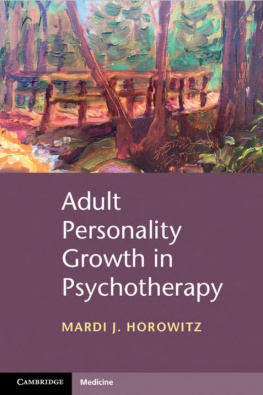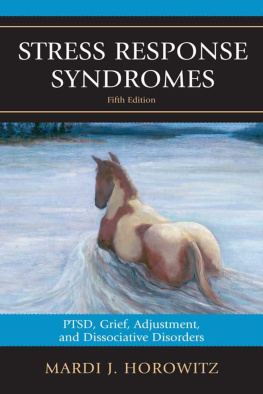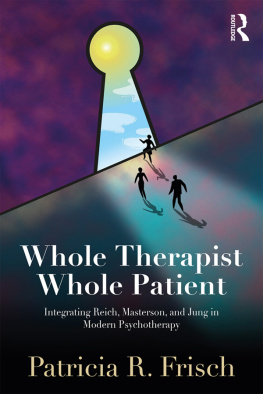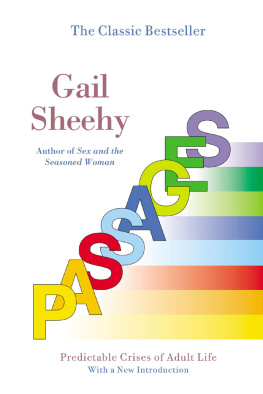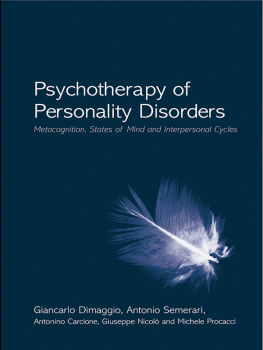Adult Personality Growth in Psychotherapy
Mardi J. Horowitz, M.D.
Distinguished Professor of Psychiatry University of California San Francisco, CA, USA
University Printing House
Cambridge CB2 8BS
United Kingdom
Cambridge University Press is part of the University of Cambridge.
It furthers the Universitys mission by disseminating knowledge in the pursuit of education, learning and research at the highest international levels of excellence.
www.cambridge.org
Information on this title: www.cambridge.org/9781107532960
Mardi J. Horowitz 2016
This publication is in copyright.
Subject to statutory exception and to the provisions of relevant collective licensing agreements, no reproduction of any part may take place without the written permission of Cambridge University Press.
First published 2016
Printed in the United Kingdom by Clays, St Ives plc
A catalogue record for this publication is available from the British Library
Library of Congress Cataloging-in-Publication
Data
Horowitz, Mardi Jon, 1934 , author.
Adult personality growth in psychotherapy / Mardi J. Horowitz. Cambridge ; New York : Cambridge University Press, 2016.
Includes bibliographical references and index.
LCCN 2016003556 | ISBN 9781107532960 (paperback) | MESH: Self Concept | Psychotherapy | Identication (Psychology) | Emotions | Adult LCC RC454 | NLM WM 460.5.P3 | DDC 616.89dc23
LC record available at http://lccn.loc.gov/2016003556 ISBN 978-1-107-53296-0
Paperback Cambridge University Press has no responsibility for the persistence or accuracy of URLs for external or third-party internet websites referred to in this publication,and does not guarantee that any content on such websites is, or will remain, accurate or appropriate.
Every eort has been made in preparing this book to provide accurate and up-to-date information which is in accord with accepted standards and practice at the time of publication.
Although case histories are drawn from actual cases, every eort has been made to disguise the identities of the individuals involved.
Nevertheless, the authors, editors and publishers can make no warranties that the information contained herein is totally free from error, not least because clinical standards are constantly changing through research and regulation.
The authors, editors and publishers therefore disclaim all liability for direct or consequential damages resulting from the use of material contained in this book.
Readers are strongly advised to pay careful attention to information provided by the manufacturer of any drugs or equipment that they plan to use.
Psychotherapy for personality growth aims towards augmenting a sense of identity,enriching relationships, and enhancing control of emotion. Integration ofthese key factors requires that a person learn to modify a narrative of characteristicsof self in the present as articulated to the past and having future goals.Therapy towards these ends changes mental structures through both consciousand unconscious processing. New modes of thinking about self and others means navigating emotionalwaters that have seemed turbulent. Safety in that course occurs by developing atherapeutic alliance, having frank conversations about dangers, and exploringnew ways of coping with them rather than avoiding them. While important,insight is not the sole road to such adaptive changes. New relationship experiencescan also lead to signicant and enduring changes in attitudes, intentions,and expectations.This book uses contemporary theories from cognitive and psychodynamicsciences, especially a modern understanding of the operation of schemas andemotional-control processes. Clinicians operating within cognitive-behavioraltherapy frameworks, especially, may value this component of complexity in caseformulation. Clinicians trained in psychodynamic therapy may value the specicemphasis on techniques to promote present moments of learning.My approach includes attention to how a clinician can understand and modifysymptoms, problems, and pathogenic feelings and thoughts. It also addresses howa therapist can increase a patients capacity for resilience, strength, and creativity.I do not argue that what I present is altogether new. Instead, I combine knownelements from many sources while trying my best for brevity, clarity, and illustration.I believe the results are consistent with modern neuroscience, developmentalpsychology, and socio-cultural understanding.Change involves the modication of congurations of meanings about identityas nested in attachments. That is why this book will progressively examine andillustrate layers of self-beliefs and narratives. This is the reason I begin with asection of three chapters focused on identity and its variation across dierentstates of mind. The second section, consisting of three chapters, centers on relationship patternsand capacities. The nal section of three chapters examines emotionalcontrol.
My academic home has been the University of California San Francisco and I thank all the patients, trainees, and faculty colleagues who have made my work over decades rewarding and stimulating. Colleagues in the MacArthur Program on Conscious and Unconscious Mental Processes, which I directed, and the sta in Chicago were also immensely supportive. The National Institute of Mental Health supported much of the research on which the knowledge in this book is based, and psychotherapy research colleagues around the world have also made it all possible. My wife, Renee Binder, M.D., is also President of the American Psychiatric Association, and Past Chairman of UCSF Psychiatry. In addition to support throughout, we have studied the key issues of where does psychotherapy go next, in relation to diagnoses and formulations. Zack Vanderbilt did major work in getting all aspects of the manuscript together. He contributed important feedback on the ideas and how they were presented. I am proud of his work. Marilyn Spoja and Bente Mirow helped rene the writing. Then Drs. Kat Lopez, Nadia Taylor, Paul Elizondo, Wendy Feng, Adam Goldyne, Chelsea Young, Tracy Foose, Serina Dean, and Alice Huang were the most vital readers who led to clarity and augmentation.
Wachtel (1993) points out the irony in these patterns, in which, the situation that the patient
ends up in is precisely the one he is trying to avoid. He does not aim for the consequences he
encounters; he produces them despiteyet because ofhis vigorous eorts to prevent them ...
The irony in what ensues lies in how, by the very act of carrying out that intention, the patient
contributes to the outcome he is trying to avoid (pp. 2324).
as well as the limits, of the therapists cultivation of a state of curiosity. Beuchler suggests that this
state often enables the therapist to help the patient maintain, or more accurately, regain the
emotional equilibrium that is crucial to the therapeutic process. In this way, she follows Schafers
(1983) and Greenbergs (1986) positions that neutrality (in the sense of equidistance between parts
of a conict) involves a state of being that aects the interpersonal eld, in addition to a set of
behaviors that avoids harsh critical judgments (Horowitz, 2013).
from unconscious fantasies to explicitly articulated desiresencompasses both Bions (1962, 1967)
concept of the therapists role as a container for the patients unconscious projections of intolerable
and unintegrated aspects of self and other, and Winnicotts (1972) concept of the therapeutic space
as a holding environment.

